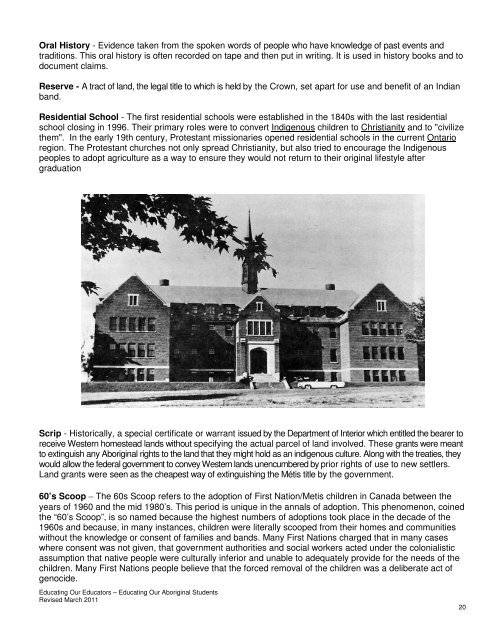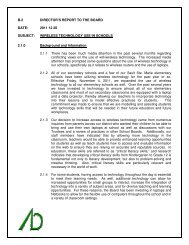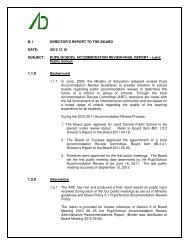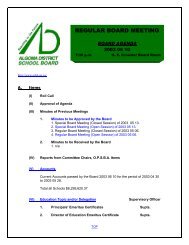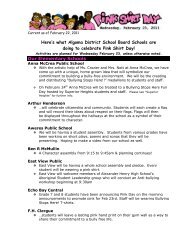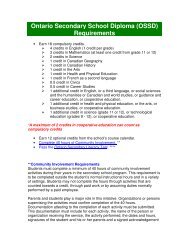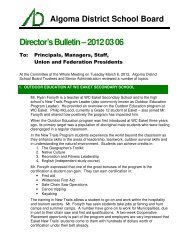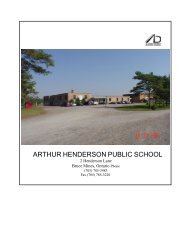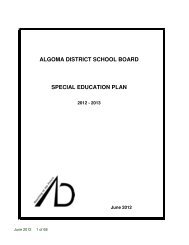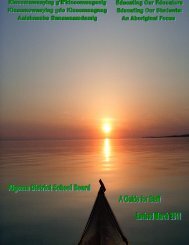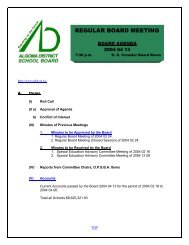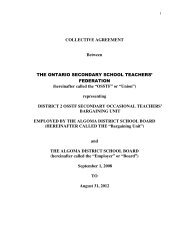Educating Our Educators Guide for Staff - Algoma District School ...
Educating Our Educators Guide for Staff - Algoma District School ...
Educating Our Educators Guide for Staff - Algoma District School ...
- No tags were found...
Create successful ePaper yourself
Turn your PDF publications into a flip-book with our unique Google optimized e-Paper software.
Oral History - Evidence taken from the spoken words of people who have knowledge of past events andtraditions. This oral history is often recorded on tape and then put in writing. It is used in history books and todocument claims.Reserve - A tract of land, the legal title to which is held by the Crown, set apart <strong>for</strong> use and benefit of an Indianband.Residential <strong>School</strong> - The first residential schools were established in the 1840s with the last residentialschool closing in 1996. Their primary roles were to convert Indigenous children to Christianity and to "civilizethem". In the early 19th century, Protestant missionaries opened residential schools in the current Ontarioregion. The Protestant churches not only spread Christianity, but also tried to encourage the Indigenouspeoples to adopt agriculture as a way to ensure they would not return to their original lifestyle aftergraduationScrip - Historically, a special certificate or warrant issued by the Department of Interior which entitled the bearer toreceive Western homestead lands without specifying the actual parcel of land involved. These grants were meantto extinguish any Aboriginal rights to the land that they might hold as an indigenous culture. Along with the treaties, theywould allow the federal government to convey Western lands unencumbered by prior rights of use to new settlers.Land grants were seen as the cheapest way of extinguishing the Métis title by the government.60’s Scoop – The 60s Scoop refers to the adoption of First Nation/Metis children in Canada between theyears of 1960 and the mid 1980’s. This period is unique in the annals of adoption. This phenomenon, coinedthe “60’s Scoop”, is so named because the highest numbers of adoptions took place in the decade of the1960s and because, in many instances, children were literally scooped from their homes and communitieswithout the knowledge or consent of families and bands. Many First Nations charged that in many caseswhere consent was not given, that government authorities and social workers acted under the colonialisticassumption that native people were culturally inferior and unable to adequately provide <strong>for</strong> the needs of thechildren. Many First Nations people believe that the <strong>for</strong>ced removal of the children was a deliberate act ofgenocide.<strong>Educating</strong> <strong>Our</strong> <strong>Educators</strong> – <strong>Educating</strong> <strong>Our</strong> Aboriginal StudentsRevised March 201120


